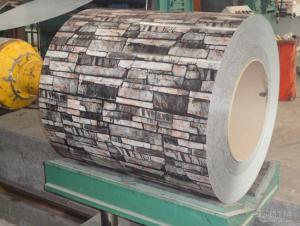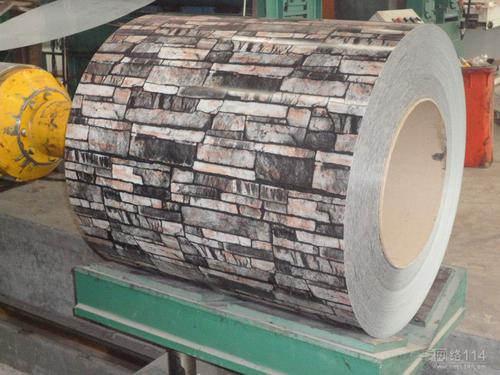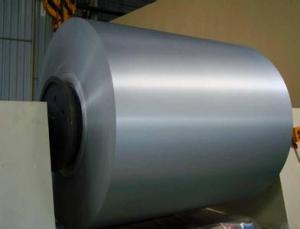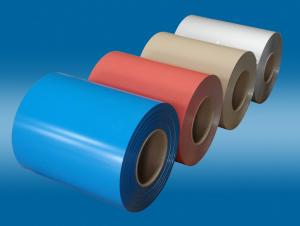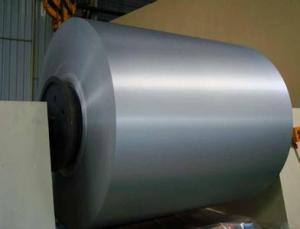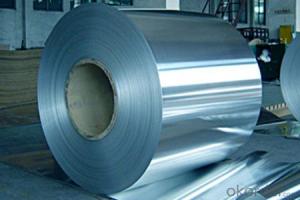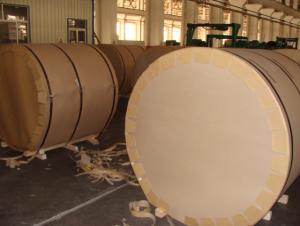Coated Aluminum Coil - 1xxx Series
- Loading Port:
- China Main Port
- Payment Terms:
- TT OR LC
- Min Order Qty:
- -
- Supply Capability:
- -
OKorder Service Pledge
OKorder Financial Service
You Might Also Like
Product Description:
1 Specifications of PE Coated Aluminum Coil/Sheet
Alloy | AA1050,AA1060, AA1070, AA1100, AA3003, AA3004, AA3005, AA3105, AA5005, AA5052, AA5754, AA5083, AA8011 |
Temper: | H12, H14, H16, H18, H22, H24, H26, H32,HO, F |
Thickness: | 0.10-4.0mm |
Width: | 10mm- 2000mm |
Coating | PE(Polyester) |
Painting Thickness | Standard 16-25 microns, max 40 microns |
Color | Acording to Ral colors or customer’s samples |
Standard: | GB/T17748-1999, ASTM, ISO, EU standard |
Special Specification is available on customer’s requirement | |
Paint Material:PPGI,BECKER, NIPPON.
PE(polyester) Coating
PVDF
2 Usage/Applications of PE Coated Aluminum Coil/Sheet
Our company's PE Coated Aluminum Coil/Sheet have been widely used in the fields of construction and decoration(garage doors, ceiling etc.), electronic appliances, lighting decoration, air-condition air pipe, sanwich panels and drainage, etc.
- Q: How do aluminum coils compare to other types of coils (e.g., copper)?
- Aluminum coils and copper coils are two common types of coils used in various industries. While both have their own advantages and disadvantages, it is important to understand how they compare to each other. One of the main differences between aluminum and copper coils is their conductivity. Copper is known for its excellent electrical and thermal conductivity, making it a preferred choice for applications that require high levels of heat transfer efficiency. Aluminum, on the other hand, has a lower conductivity compared to copper, but it is still a good conductor of electricity and heat. Another key factor to consider is the cost. Copper is more expensive than aluminum, primarily due to its higher demand and limited availability. Therefore, aluminum coils are often chosen as a cost-effective alternative, especially in applications that do not necessarily require the high conductivity of copper. In terms of weight, aluminum coils are significantly lighter than copper coils. This makes them easier to handle and install, reducing overall transportation and labor costs. The lightweight nature of aluminum coils also makes them suitable for applications where weight is a concern, such as in the automotive and aerospace industries. When it comes to corrosion resistance, copper coils have the upper hand. Copper is highly resistant to corrosion, ensuring longer lifespan and less maintenance. Aluminum, on the other hand, is more prone to corrosion, especially in environments with high humidity or exposure to certain chemicals. However, with proper coatings and treatments, aluminum coils can be protected against corrosion effectively. Durability is another aspect to consider. Copper coils are known for their durability and ability to withstand extreme conditions, making them suitable for applications where longevity is crucial. Aluminum coils, while not as durable as copper, can still provide satisfactory performance in many applications, especially when properly designed and maintained. In summary, aluminum coils and copper coils have their own distinct characteristics and advantages. Copper coils offer superior conductivity, corrosion resistance, and durability, but they come at a higher cost. Aluminum coils, on the other hand, are lighter, more cost-effective, and suitable for various applications. Ultimately, the choice between the two types of coils depends on the specific requirements, budget, and environmental factors of the application at hand.
- Q: Can aluminum coils be painted or coated with different colors?
- Aluminum coils have the capacity to be painted or coated with a variety of colors. Aluminum, being a versatile material, can be easily painted or coated to achieve the desired aesthetic appearance. The coil can undergo pre-painting or coating prior to being shaped, or it can be painted or coated after being shaped. There are different methods available to apply the paint or coating, such as spraying, rolling, or dipping. Moreover, there are numerous options for paint or coating, including powder coating, liquid paint, or anodizing, which can offer different colors, finishes, and levels of durability. In summary, painting or coating aluminum coils is a widespread practice that improves their appearance and safeguards them from corrosion or other environmental factors.
- Q: How do aluminum coils perform in extreme temperature conditions?
- Aluminum coils exhibit satisfactory performance in extreme temperature conditions. With a high melting point of approximately 660 degrees Celsius (1220 degrees Fahrenheit), aluminum is well-suited for handling high temperatures. Additionally, its exceptional thermal conductivity allows for efficient heat transfer and rapid cooling in extreme heat situations. This characteristic proves particularly advantageous in applications like air conditioning systems and refrigeration units, where aluminum coils are commonly utilized. Furthermore, aluminum is renowned for its corrosion resistance, a quality that is vital in extreme temperature settings. It resists oxidation and does not easily succumb to rust, ensuring the durability and longevity of the coils. This resistance to corrosion is especially significant in environments characterized by high humidity or exposure to salt, where alternative metals may rapidly corrode. Nevertheless, it is important to note that the performance of aluminum coils may be affected by extremely cold temperatures. In such conditions, aluminum contracts and becomes more brittle, potentially leading to reduced flexibility and even cracking. Consequently, it becomes crucial to provide proper insulation and protection to prevent any damage to the coils in extremely cold surroundings. Overall, aluminum coils can be relied upon and demonstrate commendable performance in extreme temperature conditions, particularly in applications involving high temperatures. Their high melting point, excellent thermal conductivity, and resistance to corrosion render them suitable for a wide range of industries and environments.
- Q: What industries utilize aluminum coils?
- Several industries utilize aluminum coils across various applications. Some of the main industries include the automotive sector, where aluminum coils are used in the manufacturing of vehicle bodies and parts to reduce weight and improve fuel efficiency. The construction industry also extensively uses aluminum coils for roofing, cladding, and insulation purposes due to their durability and corrosion resistance. Additionally, the aerospace industry relies on aluminum coils for aircraft construction, as they offer a lightweight yet sturdy material for structural components. Other industries such as packaging, electronics, and HVAC (heating, ventilation, and air conditioning) also make use of aluminum coils for their specific requirements.
- Q: Can aluminum coils be used in food storage facilities?
- Yes, aluminum coils can be used in food storage facilities. Aluminum is a widely used material in the food industry due to its excellent properties such as its lightweight, durability, corrosion resistance, and heat conductivity. These qualities make aluminum coils suitable for various applications in food storage facilities. Aluminum coils can be utilized in refrigeration systems, air conditioning units, and food storage cabinets, among others. Additionally, aluminum is non-toxic and does not react with food or alter its taste, making it a safe option for food storage. However, it is important to ensure that the aluminum coils used in food storage facilities are properly cleaned and maintained to prevent any potential contamination.
- Q: Can aluminum coils be used in heat exchanger fins?
- Yes, aluminum coils can be used in heat exchanger fins. Aluminum is a popular choice for heat exchangers due to its excellent thermal conductivity, lightweight nature, and corrosion resistance. The use of aluminum coils in heat exchanger fins allows for efficient transfer of heat between two fluids, making it an ideal material for this application. Additionally, aluminum coils can be easily formed into various fin shapes, providing flexibility in design and maximizing the surface area for heat transfer. Overall, aluminum coils are commonly used in heat exchanger fins to enhance heat transfer efficiency and improve the overall performance of the heat exchanger system.
- Q: What are the common surface repair methods for aluminum coils?
- There are several common surface repair methods for aluminum coils. One of the most common methods is mechanical repair, which involves sanding or grinding the damaged area to remove any corrosion or imperfections. This is typically followed by using a filler or putty to smooth out the surface and create a seamless repair. Once the filler has dried, the repaired area can be sanded again to ensure a smooth finish. Another common method is chemical repair, which involves using specialized chemicals to remove oxidation or corrosion from the surface of the aluminum coil. This can be done by applying the chemical directly to the damaged area and allowing it to react with the surface, breaking down any corrosion or oxidation. Once the chemical has done its job, the coil can be rinsed and dried, and any remaining imperfections can be addressed with mechanical repair methods. In some cases, heat repair methods can be used to repair aluminum coils. This involves using a heat gun or torch to heat the damaged area, allowing the aluminum to become soft and pliable. Once the metal is heated, it can be reshaped or manipulated to remove any dents or deformations. This method requires careful control of the heat to avoid damaging the coil further. Lastly, anodizing is a common surface repair method for aluminum coils. Anodizing involves applying a protective coating to the surface of the coil, which not only repairs any damage but also provides added protection against future corrosion or oxidation. This method is often used for more extensive repairs or when the coil is exposed to harsh environments. Overall, the choice of surface repair method for aluminum coils depends on the extent of the damage and the desired outcome. It is always recommended to consult with a professional or follow manufacturer's guidelines to ensure the best results and prolong the lifespan of the coil.
- Q: Are there any limitations to the minimum coil length of aluminum coils?
- Yes, there are limitations to the minimum coil length of aluminum coils. The minimum coil length is determined by various factors such as the manufacturing process, equipment capabilities, and the intended application of the coils. Additionally, a shorter coil length may impact the efficiency and stability of the production process, and it may affect the usability and performance of the coils in certain applications.
- Q: Can aluminum coils be used in marine applications?
- Yes, aluminum coils can be used in marine applications. Aluminum is a corrosion-resistant metal that provides excellent durability and strength, making it suitable for various marine environments. It is commonly used in boat building, marine equipment, and other marine applications due to its lightweight nature and resistance to saltwater corrosion.
- Q: How are aluminum coils used in the production of marine vessels?
- Aluminum coils are extensively used in the production of marine vessels due to their unique properties and advantages. Firstly, aluminum is a lightweight material compared to other metals commonly used in shipbuilding such as steel. This characteristic makes it ideal for constructing marine vessels as it reduces the overall weight of the ship, allowing it to float more easily in water. The use of aluminum coils in the construction process ensures that the vessel remains buoyant without compromising its structural integrity. Secondly, aluminum is highly corrosion-resistant, especially when exposed to saltwater environments. Marine vessels are constantly exposed to water, which can be corrosive and damaging to metal components. By using aluminum coils, shipbuilders can minimize the risk of corrosion and increase the longevity of the vessel. Moreover, aluminum coils offer excellent thermal conductivity. This property is crucial in marine vessels as it helps dissipate heat generated by engines, machinery, and equipment, ensuring that the ship operates efficiently and safely. Additionally, aluminum coils can be easily formed, shaped, and welded, making them highly malleable and adaptable for various shipbuilding requirements. This flexibility allows shipbuilders to create complex and streamlined designs, optimizing the vessel's performance and fuel efficiency. Furthermore, aluminum coils are environmentally friendly as they are 100% recyclable, reducing the carbon footprint associated with marine vessel production. This aspect aligns with the growing demand for sustainable and eco-friendly shipbuilding practices. In conclusion, aluminum coils play a vital role in the production of marine vessels. Their lightweight nature, corrosion resistance, thermal conductivity, malleability, and recyclability make them an ideal choice for shipbuilders. By utilizing aluminum coils, marine vessels can be constructed to be more efficient, durable, and environmentally friendly.
Send your message to us
Coated Aluminum Coil - 1xxx Series
- Loading Port:
- China Main Port
- Payment Terms:
- TT OR LC
- Min Order Qty:
- -
- Supply Capability:
- -
OKorder Service Pledge
OKorder Financial Service
Similar products
Hot products
Hot Searches
Related keywords
